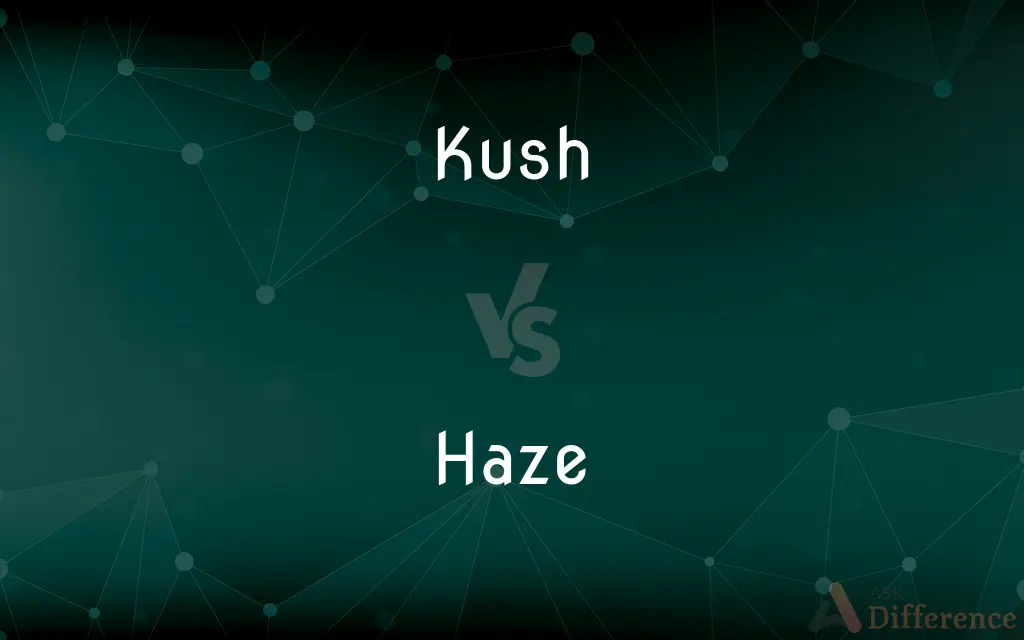Kush vs. Haze — What's the Difference?
By Tayyaba Rehman — Updated on September 22, 2023
Kush and Haze are both cannabis strains. Kush originates from the Hindu Kush mountain range and is known for its relaxing effects, while Haze has a more energizing effect and is associated with strains developed in California.

Difference Between Kush and Haze
Table of Contents
ADVERTISEMENT
Key Differences
Kush and Haze are renowned terms in the world of cannabis, each representing a distinct lineage of strains. Kush strains primarily trace their origin back to the Hindu Kush mountain range, spanning the Afghanistan-Pakistan border. This mountainous region has given rise to cannabis plants that are typically stocky, bushy, and produce relaxing, sedative effects when consumed.
On the other hand, Haze strains are historically associated with the Santa Cruz area of California. The genetic lineage of Haze is somewhat more diversified, but these strains are known for their tall, thin plants and a longer flowering period. When consumed, Haze strains often offer uplifting, cerebral, and energizing effects, contrasting the effects of the Kush lineage.
Kush strains often have a unique aroma profile, characterized by earthy, sweet, and sometimes piney or fruity scents. Their effects tend to be body-focused, making them popular choices for pain relief, relaxation, and sleep aid. Conversely, Haze strains possess a spicy, citrusy, and sometimes peppery aroma. Given their head-focused high, they're often sought after for creative endeavors, social activities, or daytime use.
One other distinction worth noting is the appearance of the plants and their buds. Kush plants, acclimated to the harsh mountain climates, are robust and stout with dense buds. Haze plants, in contrast, tend to be more elongated, with airy and fluffy buds. Both lineages, due to their pronounced effects and unique characteristics, have been used extensively in breeding, leading to a plethora of hybrid strains.
Comparison Chart
Origin
Hindu Kush mountain range
Santa Cruz, California
ADVERTISEMENT
Effects
Relaxing, sedative
Uplifting, cerebral, energizing
Plant Appearance
Stocky, bushy with dense buds
Tall, thin with airy buds
Aroma
Earthy, sweet, piney
Spicy, citrusy, peppery
Popular For
Pain relief, relaxation, sleep
Creativity, social activities, daytime use
Compare with Definitions
Kush
A lineage of cannabis strains originating from the Hindu Kush mountains.
The pure Indica genetics of Kush make it a favorite among many cannabis enthusiasts.
Haze
Offers an uplifting and cerebral high when consumed.
Artists often prefer Haze strains for a burst of creative inspiration.
Kush
Known for its sedative and relaxing effects when consumed.
After a stressful day, some people prefer Kush strains to unwind.
Haze
Haze is traditionally an atmospheric phenomenon in which dust, smoke, and other dry particulates obscure the clarity of the sky. The World Meteorological Organization manual of codes includes a classification of horizontal obscuration into categories of fog, ice fog, steam fog, mist, haze, smoke, volcanic ash, dust, sand, and snow.
Kush
Plants are typically stocky and bushy with dense bud formations.
Kush plants are well-suited to the mountainous climates they hail from.
Haze
A slight obscuration of the lower atmosphere, typically caused by fine suspended particles
The cold air has no pollution and very little haze
There was a thick haze on this October morning
Kush
Characterized by a distinct earthy and sweet aroma.
The sweet and piney undertones of this Kush strain are unmistakable.
Haze
A state of mental confusion
An alcoholic haze
Kush
Popularly used in breeding to develop hybrid strains with relaxing effects.
OG Kush is a legendary strain known for its potent effects and unique flavor profile.
Haze
Obscure with a haze
A clump of islands, very green, but hazed in cloud and mist
Kush
(slang) Marijuana, especially Cannabis indica (a variety of marijuana originating in Afghanistan and northern Pakistan, strains of which often have high THC content).
Haze
Force (a new or potential recruit to the military or a university fraternity) to perform strenuous, humiliating, or dangerous tasks
Rookies were mercilessly hazed
Haze
Drive (cattle) while on horseback
He hazed them on and they clambered up through the rocks
Haze
Atmospheric moisture, dust, smoke, and vapor that diminishes visibility.
Haze
A partially opaque covering
Let the polish dry to a haze before buffing it.
Haze
A vague or confused state of mind.
Haze
To become misty or hazy; blur.
Haze
To persecute or harass with meaningless, difficult, or humiliating tasks.
Haze
To initiate, as into a college fraternity, by exacting humiliating performances from or playing rough practical jokes upon.
Haze
Very fine solid particles (smoke, dust) or liquid droplets (moisture) suspended in the air, slightly limiting visibility. fog, mist.}}
Haze
A reduction of transparency of a clear gas or liquid.
Haze
An analogous dullness on a surface that is ideally highly reflective or transparent.
The soap left a persistent haze on the drinking glasses.
The furniture has a haze, possibly from some kind of wax.
Haze
(figuratively) Any state suggestive of haze in the atmosphere, such as mental confusion or vagueness of memory.
Haze
The degree of cloudiness or turbidity in a clear glass or plastic, measured in percent.
Haze
Any substance causing turbidity in beer or wine.
Haze
To be or become hazy, or thick with haze.
Haze
To perform an unpleasant initiation ritual upon a usually non-consenting individual, especially freshmen to a closed community such as a college fraternity or military unit.
Haze
To oppress or harass by forcing to do hard and unnecessary work.
Haze
(transitive) In a rodeo, to assist the bulldogger by keeping (the steer) running in a straight line.
Haze
(transitive) To use aversive stimuli on (a wild animal, such as a bear) to encourage it to keep its distance from humans.
Haze
Light vapor or smoke in the air which more or less impedes vision, with little or no dampness; a lack of transparency in the air; hence, figuratively, obscurity; dimness.
O'er the skyThe silvery haze of summer drawn.
Above the world's uncertain haze.
Haze
A state of confusion, uncertainty, or vagueness of thought or perception; as, after the explosion, people were wandering around in a haze.
Haze
To be hazy, or thick with haze.
Haze
To harass by exacting unnecessary, disagreeable, or difficult work.
Haze
To harass or annoy by playing abusive or shameful tricks upon; to humiliate by practical jokes; - used esp. of college students, as an initiation rite into a fraternity or other group; as, the sophomores hazed a freshman.
Haze
Atmospheric moisture or dust or smoke that causes reduced visibility
Haze
Confusion characterized by lack of clarity
Haze
Become hazy, dull, or cloudy
Haze
Harass by imposing humiliating or painful tasks, as in military institutions
Haze
A lineage of cannabis strains with roots in California.
Silver Haze has won multiple awards for its potency and flavor.
Haze
Distinct for its spicy, citrusy aroma.
The sharp citrus scent of this Haze strain invigorates the senses.
Haze
Plants are typically tall and thin with longer flowering periods.
Haze plants require patience from growers due to their extended growth cycle.
Haze
Extensively used in breeding to develop strains with energetic effects.
Lemon Haze is a popular choice for daytime activities due to its energizing properties.
Common Curiosities
Where did Kush strains originally come from?
Kush strains trace their origin to the Hindu Kush mountain range.
What aroma can one expect from Haze strains?
Haze strains often have a spicy, citrusy, and sometimes peppery aroma.
Are there hybrid strains that combine Kush and Haze genetics?
Yes, many breeders have combined Kush and Haze genetics to create unique hybrid strains.
How do Kush plants typically look?
Kush plants are stocky and bushy with dense buds.
What's the primary difference between Kush and Haze strains?
Kush strains are known for relaxing effects, while Haze strains offer an uplifting, cerebral high.
Which strain is typically preferred for pain relief, Kush or Haze?
Kush strains are often preferred for pain relief due to their body-focused effects.
What are the typical effects of Haze strains?
Haze strains are known for their uplifting, energizing, and cerebral effects.
Share Your Discovery

Previous Comparison
Extramental vs. Mental
Next Comparison
OOP vs. POPAuthor Spotlight
Written by
Tayyaba RehmanTayyaba Rehman is a distinguished writer, currently serving as a primary contributor to askdifference.com. As a researcher in semantics and etymology, Tayyaba's passion for the complexity of languages and their distinctions has found a perfect home on the platform. Tayyaba delves into the intricacies of language, distinguishing between commonly confused words and phrases, thereby providing clarity for readers worldwide.
















































